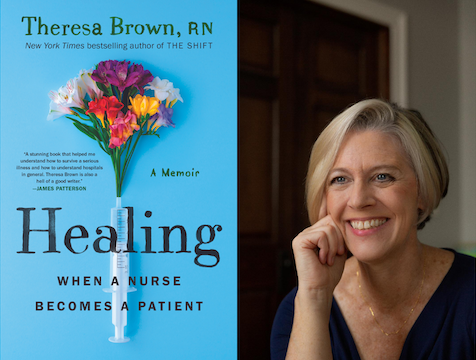It’s National Poetry Month for another minute or two, and since you probably haven’t dedicated as much time to memorizing poems as the month might suggest, I offer you absolution in the form of a poem composed by a woman whose work concerns itself with absolution.

Tina Carlson, Ojo Caliente, NM
Tina Carlson, a psychiatric nurse practitioner, released her first book of poems, Ground, Wind, This Body, through University of New Mexico Press in March. The book is a chronicle of sorts, one that winds through the wretchedness wrought by war and the deep, lifelong impression it leaves in the lives of a returning soldier’s children.
Tina is a dedicated nurse who works with the homeless in Albuquerque and a true poet—and what a combination: a carer both of human beings and of the language we use to shape and reshape our experience—who is also one of my dearest friends.
Try reading this poem aloud. It comes about midway through her book (offered here with the poet’s permission):
Summer Nights
After rain, the earth shines in gratitude. We are nine,
awake on wet grass and the sky, a vast cup of stars.
Because our lives are small fires buried under dry fields,
the muddy homes of childhood, auditoriums of weeds, and trees.
Even discomfort glistens here.
The whole world breathes together, watches messages
pass across the wide face of the moon. We were born into wildness
after the war. Each year, watch the hillsides burn aspen yellow,
then the wind changes everything to brown.
For you, I am an arsonist.
Our fathers take aim at us behind doors with imaginary weapons,
still living in battle. Almost criminal, our desire to thrive in this world.
Our futures arrested, like the cat’s gift in the doorway:
birdlike, perfectly curled into the shape of an egg, gelatinous.
Even after several re-readings I am left breathless by that last image.
With the astonishing opening lines we begin in thankfulness for a thirst quenched, for the simplicity of wet grass and cupped stars—a childlike sweetness that gives way immediately to an underground fire. By line 3 we know we are in hell, navigating atemporally a place that by some unnamed grace makes even pain beautiful.
The poem doesn’t let on who “we” are, and so it allows me to step as a nine-year-old into that space. “For you, I am an arsonist,” the speaker says, implicating me in the near-criminality of a “desire to thrive,” despite our aborted future that has been left uncannily as a “gift.”
When the speaker states “We were born into wildness / after the war” she means the Second World War, but she could also be referencing our current landscape of perpetual War on Terror. Regardless, wildness in this poem’s universe is a two-headed thing, both a natural and a manmade chaos, one that helps us survive our wounded fathers and also nearly annihilates us.
Such antipodal tensions abound in this poem, as throughout the book. Redemption is almost always at hand, as in these brilliant lines, in which it seems that the entire world is being born and dying at the same time:
The whole world breathes together, watches messages
pass across the wide face of the moon.
Yesterday was Poem in Your Pocket Day, but it’s not too late to print this one out, or another of her poems from the book, “Ojo Caliente: Metamorphoses,” that recently appeared on Verse Daily. Carry it with you. Give it to a colleague. Read it to a friend over lunch.
I asked Tina what it’s been like to have this book published. She said by email: “Having this book out in the world was initially terrifying. So much was never supposed to be spoken. But the book itself, like a child, has its own life now, and wants the secrets to be over and the war wounds to be healed.”
Poetry has often served to bear witness and to speak the unspeakable.
I’ve been reading Tina Carlson’s numinous poems for more than 20 years. It thrills me that now you can read them, too.









